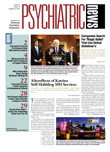I spend a few hours every week supervising psychiatry residents in psychotherapy. In one recent month, we talked about how to greet a patient, how to interpret body posture and body language, and how to manage a basic session. We reviewed defense mechanisms and identified possible themes that might appear with each of these patients. We talked about personality makeup and developmental theorists.
These sessions go as well as they can with residents new to psychotherapy. Then a few weeks into the start of a new year, a resident brings up in supervision that her patient has only 20 insurance-paid visits per calendar year. Her patient cannot afford more sessions and can barely make the copays, much less the deductible. The patient spends time expressing fears that she will not be able to come very often, despite acknowledging that she needs and benefits from the sessions. The resident is perplexed. How do you establish rapport, identify goals, and allow patients to arrive at their own conclusions at their own time when you see the patient every two to three weeks?
Hence we change format to CBT, DBT, and IPT: problem-focused therapies. Though these modalities are demonstrated to be effective in helping patients, I am left to wonder if there is a place in modern psychiatry, with new medications and insurance-driven treatment, for the teaching of more traditional insight-oriented therapy. Though fewer patients can afford this, and perhaps even fewer are actually willing to invest the time and energy in self-discovery, this mode of therapy has, in my opinion, great value for training new and young therapists. I fondly recall my own training at Georgetown and being able to sit with a supervisor and talk about therapy sessions: what the patient did, how I felt, what I did, why I did what I did. These questions are not trivial and are sometimes difficult to answer. Countless hours in supervision have surely expanded my skills, whether it be in medication management, consultation, or therapy.
So we trudge along, trying to accommodate patient needs and insurance restrictions, spreading sessions apart to “make them last” for the length of the year. I find that even with this, I challenge my residents to consider transference/countertransference issues. Consider a“ med-check” appointment. Does a mildly dysthymic patient who feels lonely need an antidepressant? The biological rationale most residents can identify: increase serotonin. But consider the psychological rationale. Perhaps the medication serves a role as a transitional object to the doctor. Perhaps it gives the patient hope that “someone cares.” There are psychological undertones and implications of what we do as doctors in non-“therapy” appointments that are not insignificant and have therapeutic (and sometimes countertherapeutic) effects.
I write this letter to remind trainees as well as mentors that, in fact, there is a role for teaching psychotherapy skills in modern psychiatry, even during an era when HMOs rule the land and 15-minute med checks are the rule rather than the exception.
MATHEW NGUYEN, M.D.
Gainesville, Fla.
